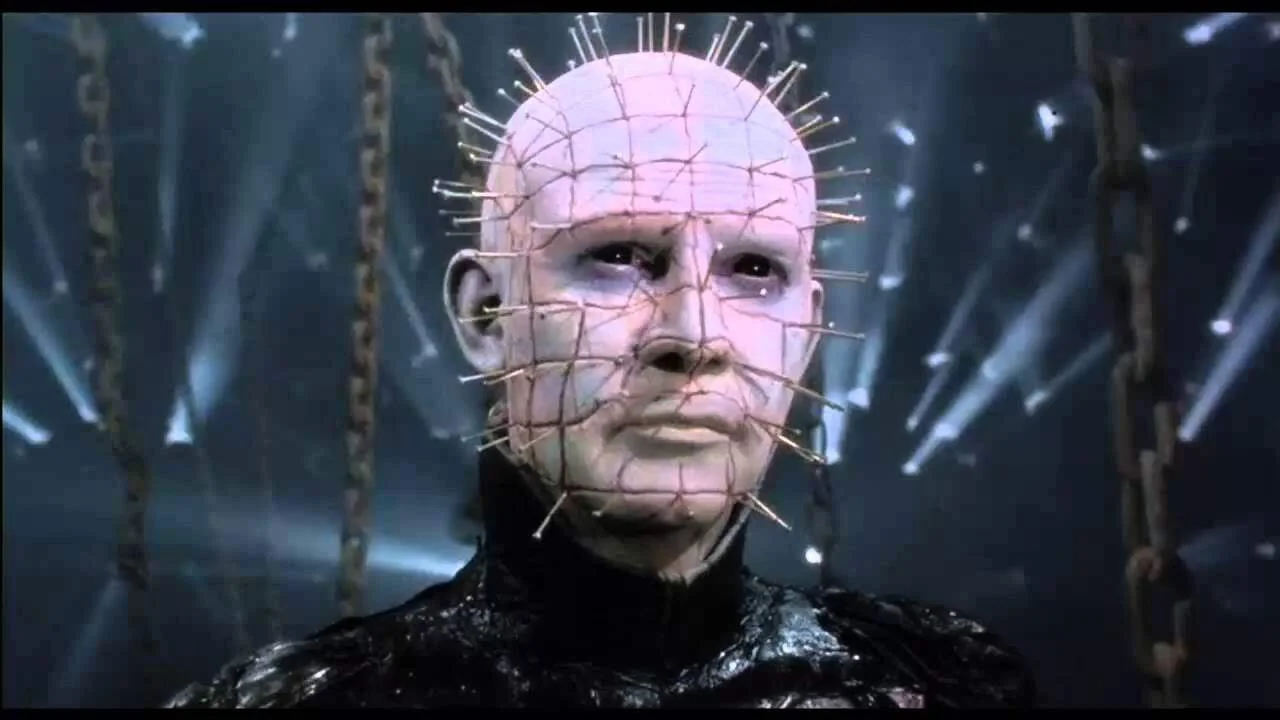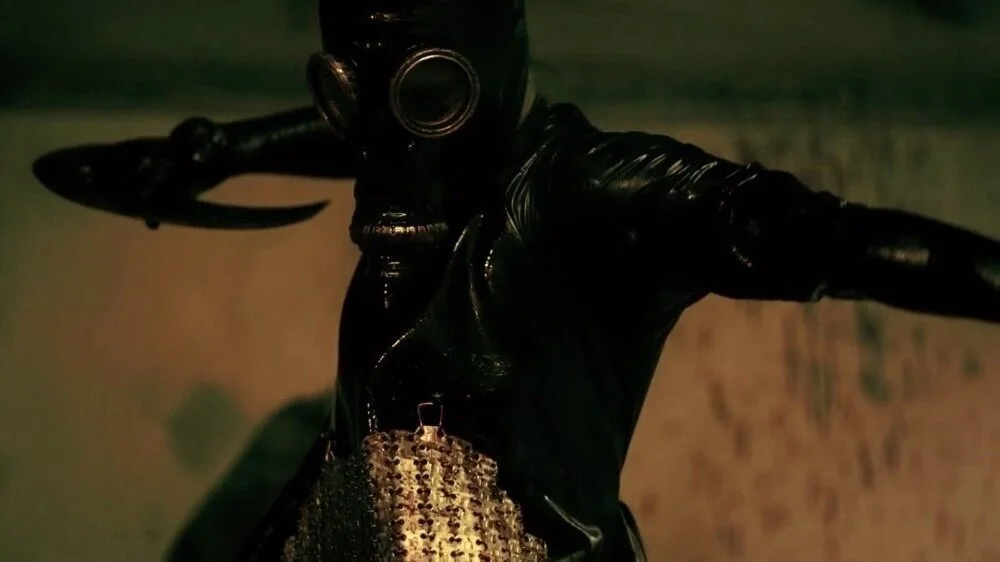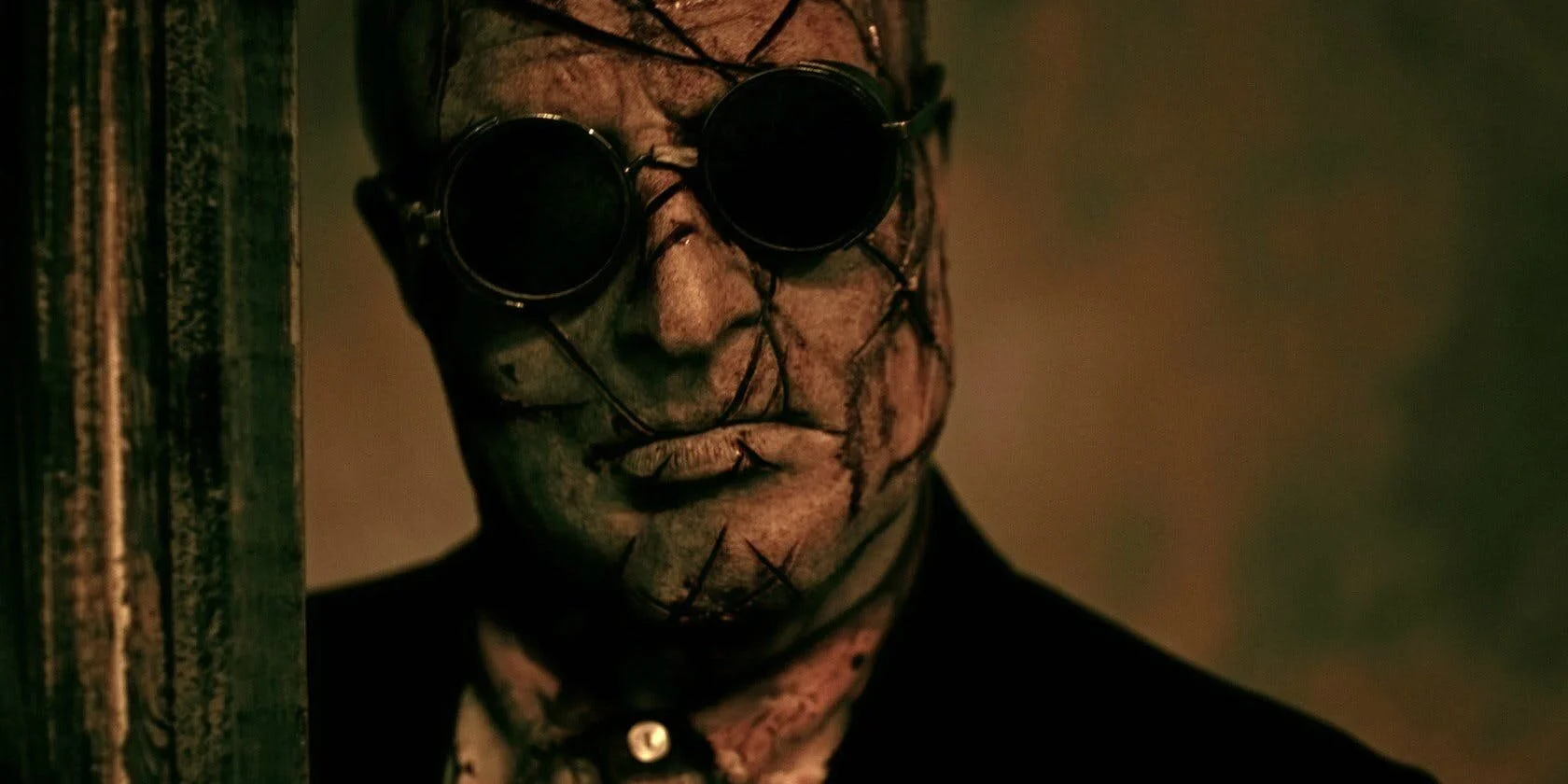[Film Review] Hellraiser: Judgement (2018)
The story of the Hellraiser series is one that, appropriately maybe, has seen a lot of suffering along the way. After Clive Barker adapted his own novella The Hellbound Heart for 1987's Hellraiser and introduced the world to Doug Bradley as everyone’s favourite Hell Priest Pinhead, there have been a couple of sequels of decent quality.
However, generally it’s been a mess of executive meddling and scripts that weren’t originally Hellraiser films being repurposed to include Pinhead and his Cenobites. Now we have Hellraiser: Judgement, written and directed by Gary J. Tunnicliffe, series make-up effects artist who also wrote 2011’s Hellraiser: Revelations which was not well received. Does this latest entry into the franchise redeem its past sins?
Police detectives and brothers Sean and David Carter (Damon Carney and Randy Wayne) are investigating a dark and disturbing case as a killer called The Preceptor is slaughtering people in reflections of the biblical Ten Commandments. With the latest killing mirroring the eighth commandment there are only two remaining and, running out of time, the pair are assigned an additional partner, Christine Egerton (Alexandra Harris) , to help them. Meanwhile, the forces of Hell are extending their reach in new horrifying ways. Both the laws of man and Hell are about to meet, and even Heaven may be taking an interest in the outcome.
Hellraiser: Judgement was actually made in 2018 but shelved due to reasons related to certain information about its executive producer Harvey Weinstein coming to light, and indeed seeing his name pop up on screen elicited more revulsion from me than just about anything in the actual film. It was honestly better left off on the shelf where it was, because while it’s not as immediately heinous an entry as 2011’s Hellraiser: Revelations, (although that’s not saying much), you just wish that Dimension would let the series rights’ go so that someone else can get a chance.
It’s not long before you can see one of the biggest problems with Hellraiser: Judgement; it’s lacklustre plot. Now, police procedure in horror can work fairly well, but it’s something we’ve also seen so many times. Seven (and we’ll get back to that), Deliver Us from Evil, even the first of Hellraiser’s direct to video sequels Hellraiser: Inferno, directed by Deliver Us from Evil’s Scott Derrickon, played with this kind of story. We know the ins and outs of it. One of the detectives is too into the case? Check. He neglects his family for work? Check. Some gory bodies displayed in very art student installation poses? Check, check, check. This can still be watchable if done well, but all we get here is fairly flat acting and plot progression you’ll see coming a mile away. It even takes some of the same beats from Hellraiser: Inferno such as details about chopped off body parts having been removed while the person was still alive, and a scene with one of the detectives and his wife. Then there are the Seven comparisons only with the Ten Commandments instead of the Seven Deadly Sins, but with less urgency and little to no mystery to keep you invested.
But what is a Hellraiser movie without, well, Hell? Although we don’t really get to see Hell itself here, more a remote branch office of it. We meet The Stygian Inquisition, although they are never named directly in the film itself, consisting primarily of the Auditor, played by Tunncliffe himself. There is also a kind of Hell’s secretary transcribing people’s sins on a typewriter powered by the person’s own blood, the Assessor, who is probably the least monstrous part of all , and the finally the Jury, making sure to keep the female denizens of Hell not too disfigured and with their boobs unmarred and on show, of course. The idea of other factions of whatever Hell space the Cenobites inhabit is an interesting one, and honestly the initial sequence we see of them operating is quite disturbing in its own way. If it was its own little short film about the clerical inner workings of Hell I’d find it a neat little idea but not overly stunning. The problem is that it’s so unclear why Pinhead is even allied with them. Other Cenobites include another series' favourite Chatterer and a pair that look like an update of the Wire Twins from Hellraiser: Inferno, but they don’t exactly serve any purpose. In fact, you could remove Pinhead and the Cenobites themselves, leaving the Auditor and his entourage, and apart from a few scenes at the very end absolutely nothing about the film’s story would change. Sure, Pinhead can work best when he is not overused, but when his presence is superfluous to a Hellraiser film then you’ve done something wrong. Heaven gets involved with an Angel who is just a person in a white suit like one of the background angels in Good Omens, and it’s all just so overdone that it’s hard to care anymore. If anything, it ends up feeling like the film is more of a setup for Tunncliffe’s own characters than anything else, compounded by the fact that he himself plays the Auditor.
It’s a poor introduction to the series for newcomers, and it has little to offer for long-time fans. The references to the original film are obvious and awkward to the point of being eye-rolling. Also there’s an unremarkable one scene cameo from a member of the Final Girl Pantheon Heather Langenkamp (Our Lady of Dreams) whose inclusion just feels like something to give the movie a bit more horror pedigree.
There are good elements to Hellraiser: Judgement, but the final verdict is that it’s just too buried in viscera and poorly executed to be the series revival it clearly wants to be. They think they have such sights to show you, but you’re better off not watching them.




























![[Film Review] Mercy Falls (2023)](https://images.squarespace-cdn.com/content/v1/5fe76a518d20536a3fbd7246/1695482997293-E97CW9IABZHT2CPWAJRP/Screenshot+2023-09-23+at+16.27.27.png)
![[Film Review] Perpetrator (2023)](https://images.squarespace-cdn.com/content/v1/5fe76a518d20536a3fbd7246/1695483561785-VT1MZOMRR7Z1HJODF6H0/Screenshot+2023-09-23+at+16.32.55.png)
![[Film Review] Sympathy for the Devil (2023)](https://images.squarespace-cdn.com/content/v1/5fe76a518d20536a3fbd7246/1697186986143-QDVLQZH6517LLST682T8/Screenshot+2023-10-13+at+09.48.52.png)
![[Film Review] Shaky Shivers (2022)](https://images.squarespace-cdn.com/content/v1/5fe76a518d20536a3fbd7246/1696442594997-XMJSOKZ9G63TBO8QW47O/Screenshot+2023-10-04+at+18.59.33.png)
![[Film Review] V/H/S/85 (2023)](https://images.squarespace-cdn.com/content/v1/5fe76a518d20536a3fbd7246/1697455043249-K64FG0QFAFVOMFHFSECM/MV5BMDVkYmNlNDMtNGQwMS00OThjLTlhZjctZWQ5MzFkZWQxNjY3XkEyXkFqcGdeQXVyMTUzMTg2ODkz._V1_.jpg)
![[Film Review] Kill Your Lover (2023)](https://images.squarespace-cdn.com/content/v1/5fe76a518d20536a3fbd7246/1697465940337-T55VQJWAN4CHHJMXLK32/56_PAIGE_GILMOUR_DAKOTA_HALLWAY_CONFRONTATION.png)
![[Film Review] Elevator Game (2023)](https://images.squarespace-cdn.com/content/v1/5fe76a518d20536a3fbd7246/1696440997551-MEV0YZSC7A7GW4UXM5FT/Screenshot+2023-10-04+at+18.31.42.png)
![[Film Review] A Wounded Fawn (2022)](https://images.squarespace-cdn.com/content/v1/5fe76a518d20536a3fbd7246/1695484054446-7R9YKPA0L5ZBHJH4M8BL/Screenshot+2023-09-23+at+16.42.24.png)

![[Editorial] 9 Terrifying Cerebral Visions in Horror Movies](https://images.squarespace-cdn.com/content/v1/5fe76a518d20536a3fbd7246/1693509801235-X23OL50T1DVGECH0ZJK2/MV5BMjQ0MTg2MjQ4MV5BMl5BanBnXkFtZTgwMTU3NDgxMTI%40._V1_.jpg)
![[Editorial] 5 Female Focused Horror Book Recommendations](https://images.squarespace-cdn.com/content/v1/5fe76a518d20536a3fbd7246/1696441981361-52EQCTJ7AT2QF1927GM7/919xtm6d3fL._AC_UF894%2C1000_QL80_.jpg)
![[Editorial] 9 Horror Nintendo Switch Games To Play](https://images.squarespace-cdn.com/content/v1/5fe76a518d20536a3fbd7246/1697214470057-3XZXX8N4LYIMDFWS6Z3P/Screenshot+2023-10-13+at+17.20.13.png)
![[Editorial] 9 Best Slashers Released Within 10 Years of Scream (1996)](https://images.squarespace-cdn.com/content/v1/5fe76a518d20536a3fbd7246/1695478839037-LOFHGVM3H6BMSZW7G83M/Screenshot+2023-09-23+at+15.15.11.png)
![[Editorial] 10 Films & Events to Catch at Soho Horror Film Fest 2023](https://images.squarespace-cdn.com/content/v1/5fe76a518d20536a3fbd7246/1700819417135-299R7L4P0B676AD3RO1X/Screenshot+2023-11-24+at+09.41.52.png)
![[Mother of Fears] I Don’t Wanna Be Buried in a Pet Sematary (1989) and (2019)](https://images.squarespace-cdn.com/content/v1/5fe76a518d20536a3fbd7246/1691328766069-QFNAVJOMFZVZ5CLU1RWM/Screenshot+2023-08-06+at+14.23.13.png)
![[Mother of Fears] Mothering in Silence in A Quiet Place (2018)](https://images.squarespace-cdn.com/content/v1/5fe76a518d20536a3fbd7246/1696445921315-HZJ2DZYQIH6VVWXBO2YL/Screenshot+2023-10-04+at+19.52.29.png)
![[Mother of Fears] Mother Vs. Monster in Silent Hill (2006)](https://images.squarespace-cdn.com/content/v1/5fe76a518d20536a3fbd7246/1695485781119-H6GNP0G3J2TLPAOIABV7/Screenshot+2023-09-23+at+17.11.56.png)
